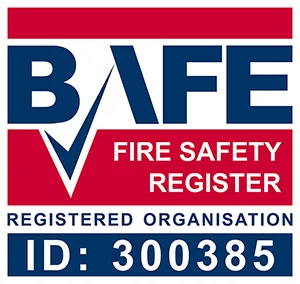Warehouse fire alarm systems need looking after – on a regular basis!
The British Standard that covers commercial fire alarm systems (BS 5839) stipulates that every system should be inspected twice yearly, by a competent professional.
But that doesn’t mean to say that the system should be left to its own devices for the rest of the time. Regular self-testing by a nominated responsible person or persons within the company should also be carried out and logged - in the same way that it would be done by the professional servicing provider.
Fire Alarm Service and Maintenance Checklist
Regular testing and maintenance of warehouse fire detection and alarm systems are essential to guarantee that they are functioning correctly, in order to protect the safety of all occupants and the equipment within.
That’s why it’s important to create a comprehensive fire alarm system maintenance plan, so that any issues can be addressed efficiently and safely. It will also help ensure that you aren’t plagued with false alarms. You only want the system to be activated because of a genuine emergency.
Regular testing and maintenance of your warehouse fire alarm system should include:
1. Fire Alarm Sensors and Detectors
All fire alarm sensors and detectors need to be checked, as they are the lynchpin of an efficiently run system. This should extend to any smoke detectors, heat detectors, flame detectors, as well as any specialist sensors that may be an integral part of the installation. A comprehensive service and maintenance plan will cover all these elements, identifying any equipment that may need repairing or replacing.
2. Sounder and Alert Devices
If your fire system can’t be clearly heard or doesn’t sound at all when there is genuine emergency, then it’s not fit for purpose. Your maintenance plan should ensure the system’s audibility is regularly tested – covering all sounders and alert devices that have been installed throughout the warehouse premises. When we say loud, we mean loud enough to be heard over any music that may be playing or noise from machinery.
Also, to ensure the full protection of anyone who might be hard of hearing, engineers should test the effectiveness of visual strobe lights, which are there to offer an alternative to the sounders.
3. Power Supply and Battery Back-up Systems
Without a reliable power supply, the effectiveness of your warehouse fire alarm system could be seriously compromised. As a matter of course during every maintenance visit, there should be checks to make sure the power supply is connected and functioning and that all back-up batteries are fully charged. If there is a power outage, the batteries need to be robust enough to support the fire alarm.
4. Control Panel Function and Integration
Servicing and maintenance should also focus on the hub of the warehouse fire alarm system - the control panel. This will involve verification of the panel’s functionality, to ensure it is properly integrated with all connected devices around the warehouse, such as sprinkler systems. At all times, it should display accurate, visible information, ensuring it responds appropriately to any sensor activations.
5. False Alarms and Troubleshooting
If you have been subject to false alarms, this can be disruptive on both a human and business level. Unwanted activations might be due to dust build-up, other disturbance or detritus setting off the alarm or because of faulty equipment. Whatever the reason, this shouldn’t happen and it’s important that the cause of any false alarms is addressed as soon as possible.
Regular testing by trained engineers should ensure that these incidents don’t occur and, if they do, that they are remedied once and for all. The worst thing that can happen is that warehouse occupants become desensitised to genuine emergencies. That’s why it’s important to troubleshoot these types of issue, to ensure that they never occur or only very rarely.
6. Detailed Records of Fire Alarm Maintenance Activities
Keeping an updated logbook of all fire alarm-related maintenance and testing is necessary for a business to remain compliant with regulation. Insurance companies will also require accurate records to be kept.
Dates and times of engineer visits, along with weekly internal equipment testing and inspection should all be documented. These in-house maintenance checks should test a different call point each week and to make sure that the control panel display is in order. If any faults are indicated, a professional engineer should be notified immediately.
Next Steps
Justice Fire and Security have specialised in the design, installation, maintenance and monitoring of warehouse fire safety solutions for the past four decades.
If you have any concerns about the maintenance and overall performance of your warehouse fire alarm system, contact our main switchboard on 0845 468 9077






